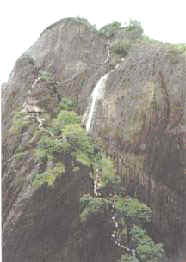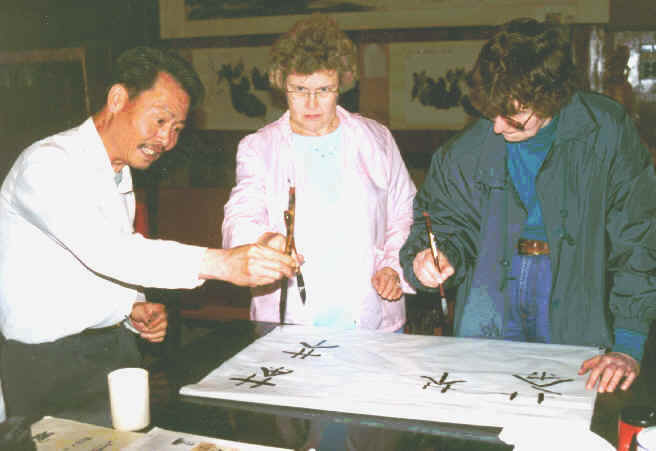
CHINESE CULTURE STUDY TOUR
WELCOME TO MOUNT WUYI
The Wuyi Mountains, located in Northern
Fujian, covers 60 sq. km and is one of the most popular scenic spots and holiday resorts
in the nation. A masterpiece of nature¡¯s craftsmanship, Wuyi's natural scenery, with its red mountains and green waters,
has the reputation of being a scenic wonder in Southeast China. The chief attractions are
the Nine-Bend Stream and the thirty-six peaks. The Nine0bend Stream meanders along the
foot of an undulating chain of mountains like a ribbon. Wuyi¡¯s 36 graceful peaks are covered with perennial green. Wuyi¡¯s scenery is always marvelous, making
people feel as if they were in a paradise. Sailing down the Nine-twist Stream on a bamboo
raft is an exciting and unique experience. Wandering through the scenic sights, one cannot
but marvel at such beauties as Jade Girl Peak, Heavenly Tour Peak, and the like. While
climbing on the steep pathways to the summit of a peak, one may take in the wonderful
views of other peaks as well as the stream.
Wuyi is not only a remarkable scenic spot but also a place of long cultural history and has many historical relics, such as the Wuyi House of Quintessence, Where Zhu Xi, a great philosopher of Song Dynasty ( in the 12th century A. C. ), once lectured. Other intriguing sights include the 3000 year old ancient boat coffins lodged in the cliffs, the Imperial Tea Garden, more than 700 cliff inscriptions by celebrities through the ages, and Hancheng Town, Chencun, also called ¡° Guyue Town¡±, the best preserved Han-Dynasty town site south of the lower reaches of the Changjiang River. In addition, the Wuyi Mountains has been designated by the nation as a nature reserve. Occupying an area of 57,000 hectares, it is rich in natural resources. There are many kinds of flowers, rare species of plants, birds, animals and precious medicinal herbs. The Wuyi Rock Tea, with its bright color, fragrant scent and mellow taste, is well received both at home and abroad. The Wuyi mountains and waters await your arrival.
¡¡
A BRIEF INTRODUCTION TO
WUYISHAN INTERNATIONAL LANTING COLLEGE
The Wuyi Mountains, in the north part of China's Fujian province, has been a famous cultural region for over 1000 years. The area has simultaneously served as a religious center for China¡¯s three main faiths, Confucianism, Taoism and Buddhism. During the Qin, Han and Song dynasties, as many as 245 temples, pavilions, halls, altars, huts, towers and platforms were built by the adherents of different religions and sects.
Many famous scholars of Confucianism, eminent
figures of both Taoism and Buddhism, men of letters and alchemists gathered and lived in
the Wuyi mountains. They propagated their doctrines, wrote and propounded their ideas, and
exchanged points of view. By the Song Dynasty, the Wuyi mountains had developed into the
center of Chinese culture.
This historic wonderland of traditional Chinese culture provides the perfect backdrop for the Wuyishan International Lanting College, which was first established in 1985.
Welcoming students of traditional Chinese culture from all over the world, the college organizes travel, lecture, and discussion programs for individuals and groups with an emphasis on several traditional topics. The programs are designed and delivered in the same historical method of ancient China which came to be known as the Wuyi House of Quintessence.
Faculty
In addition to its well-known professors, the college frequently supplements its staff with a number of famous special guest professors and masters from the Chinese Academy of Social Sciences, Qinhua University, Xiamen University, Fujian Normal University, Zhejiang University of Fine Arts and other educational institutions.
Courses
Martial Arts and Qigong These basic training techniques and exercises are requisites for every student serious about maintaining good health and increasing longevity.
Traditional Cultures
Confucianism The most influential school of thought in ancient China, Confucianism has been the dominant academic tradition for over 2000 years. Chiefly a system of social and political values, it has left a legacy of tremendous national cultural heritage for later generations.
Zhu Zi's Idealist Philosophy The system of thought of the Song and Ming Dynasties, as represented by Zhu Xi, epitomizes the Chen Zhu idealist philosophy. Zhu Xi established a comprehensive and unique academic system, which influenced later academic development for six to seven hundred years. Even today it continues to influence Chinese traditional cultural heritage internationally.
Lao Zhuang Theory The Taoist school of philosophy consists mainly of the teachings of Lao Zi and Zhuang Zi. They both talked about "Dao De¡±( Way and Virtue), and man's place in the interplay of the natural forces of heaven and earth. It also espouses some different concepts about the nature of the universe.
The Classics of Zhou Yi Conjecture on the changes of Nature and society, this school of thought holds that the interaction of Yin and Yang is the source of everything.
Poems and Music Chinese poetry has a rich and long history and is extensive in both quantity and variety. From the 2000 year old Book of Songs and Li Sao, to the poetry and Ci, or lyrics of the Tang and Song Dynasties, these arts have profoundly influenced the development of China¡¯s literature, and also have a close relationship with the national music.
Painting and Calligraphy Chinese calligraphy and Chinese brush painting are closely related because lines are used in both. Simple lines are turned into a highly developed form of art. Lines are used not only to draw contours but to express the artist¡¯s concepts and feelings. Traditional Chinese painting combines the arts of poetry, calligraphy, painting and seal engraving. The specially made tools and materials include: Chinese brush, ink, paper, ink stone and silk. These unique elements together express the artistic characteristics of the Chinese people.
Other Subjects
Subjects related to Chinese medicine, massage, acupuncture, nail pressing, Fengshui, Buddhism, etc., can be designed to specific requirements.
Other special subjects can also be taught with advance notice.
Teaching Method
The college maintains the traditional methodology of the academy of classical learning. In this teaching system the main emphasis is on academic lectures which are supplemented with a combination of classroom discussion and cultural field trips. Students can select from the college¡¯s three standard study terms: 15 days, one month, and 2 months. Study subjects are arranged alternatively with sightseeing, investigation, visits and field trips. Unified teaching and collective activities are designed for every class as a unit. A graduate certificate is granted to the student upon the completion of the term.
The college offers formal courses of further education for students and adults, who are preparing for the national entrance examination for higher learning or who study for self improvement. With approval of the provincial government, in 1998, the college began setting up new programs for undergraduate studies for the Associates Degree of Science and Art.
Accommodation
The Lanting Hotel and Nine Bend Hotel are located on the outskirts of Wuyishan city, in a scenic area with beautiful surroundings.
Expenses
668 USD per person for the 15 day term. This price includes class tuition, room and board, tour cost and field trip activities.
¡¡
For registration or inquiries, please contact:
Wu Junmei, Assistant Director
Overseas Programs
Wuyishan International Lanting College
E-mail: [email protected]
¡¡
Three Odes Calligraphy Study Tour
D1 Arrive Xian
D2 Visit Forest of Steles, Huaqing Hot Springs, Terra Cotta Warriors & Horses of Qin, Big Goose Pagoda, Night Train to Luoyang
D3 Visit Linyan Temple, Buge Ode Coach to Hanzhong
D4 Visit Hantai Museum, Shimen Ode, South Lake
D5 Coach to Chenxian Visit Zhangliang Temple
D6 Visit Xixia Ode Coach to Tianshui
D7 Visit Maijishan Grottoes, Yuquan Taoist Temple, Fuxi Temple Night Train to Xi'an
D8 Leave Xi'an
Depature Dates: 3rd and 19th of every month
¡¡
Fuxi Eight Diagrams & ZhouYi Study Tour
D1 Arrive Xian
D2 Terra Cotta Warriors & Horses of Qin, Huaqing Hot Springs Train to Tianshui
D3 Visit Maijishan, Fuxi Temple
D4 GuaTaiSahn(Where Fuxi Drew the Divinatory Symbols), Academic Exchanges of Book of Changes Train to Zhengzhou
D5 Coach to Zhoukou
D6 Fuxi Temple at Taihao Mausoleum, Huaiyang Coach to Zhengzhou
D7 Leave Zhengzhou
Departure Dates: 12th and 20th of every month
¡¡